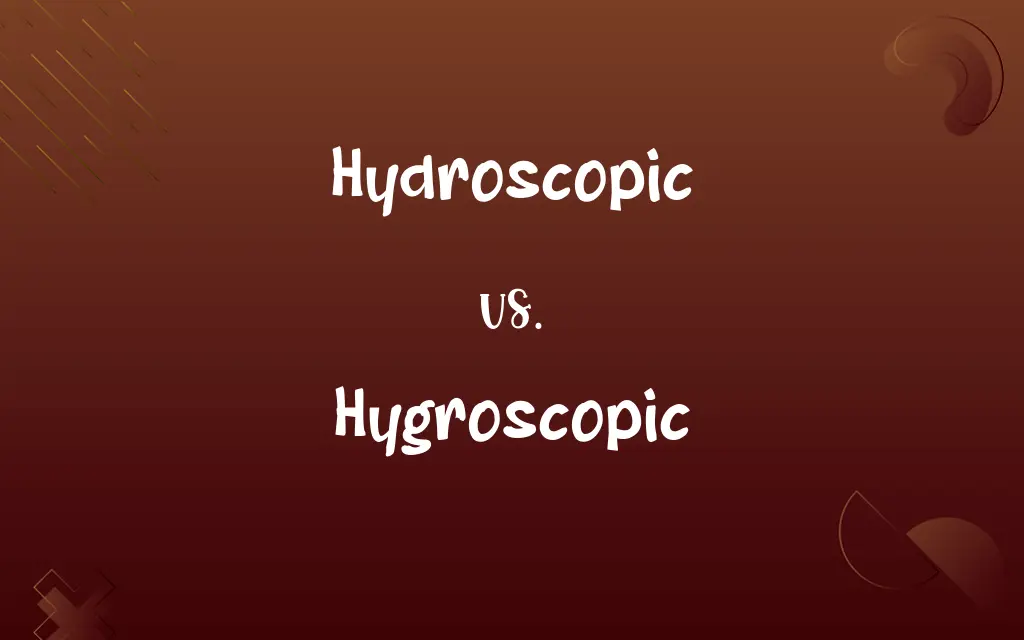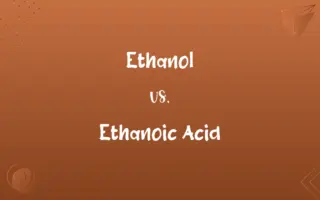Hydroscopic vs. Hygroscopic: Know the Difference

By Shumaila Saeed || Published on February 14, 2024
Hydroscopic is a common misnomer, often incorrectly used in place of hygroscopic. Hygroscopic refers to substances that absorb moisture from the air.

Key Differences
"Hydroscopic" is a term often mistakenly used when referring to the characteristic of absorbing water, which is correctly termed "hygroscopic." Hygroscopic substances, on the other hand, are materials that attract and hold water molecules from their surroundings, typically the air.
Shumaila Saeed
Feb 14, 2024
In most contexts, "hydroscopic" is a misapplied term and does not have a scientific definition, implying a non-existent property. In contrast, hygroscopic substances are crucial in various industries due to their ability to maintain moisture balance, such as in food preservation and pharmaceuticals.
Shumaila Saeed
Feb 14, 2024
The misuse of "hydroscopic" instead of "hygroscopic" can lead to confusion in scientific and industrial contexts. Hygroscopic materials include salts, sugars, and certain types of clay, all known for their moisture-absorbing properties.
Shumaila Saeed
Feb 14, 2024
There is no scientific basis or standard definition for "hydroscopic," whereas hygroscopic substances are characterized by their physicochemical properties, which enable them to absorb and retain water.
Shumaila Saeed
Feb 14, 2024
In summary, "hydroscopic" is a term that is often incorrectly used and does not describe a real property. "Hygroscopic," however, accurately describes the property of substances that attract and absorb water from their environment.
Shumaila Saeed
Feb 14, 2024
ADVERTISEMENT
Comparison Chart
Definition
A misnomer with no scientific basis
Substances that absorb moisture from the air
Shumaila Saeed
Feb 14, 2024
Usage in Science
Incorrect and non-existent
Widely recognized and scientifically valid
Shumaila Saeed
Feb 14, 2024
Relevance
None, as it's a mistaken term
Essential in industries for moisture control
Shumaila Saeed
Feb 14, 2024
ADVERTISEMENT
Hydroscopic and Hygroscopic Definitions
Hydroscopic
A common error in place of hygroscopic.
Many people mistakenly say 'hydroscopic' when they mean 'hygroscopic.'
Shumaila Saeed
Jan 13, 2024
Hygroscopic
Attracts water molecules.
Hygroscopic materials like salt can clump together in humid conditions.
Shumaila Saeed
Jan 13, 2024
Hydroscopic
Often mistaken for hygroscopic.
The term 'hydroscopic' was incorrectly used in the report instead of 'hygroscopic.'
Shumaila Saeed
Jan 13, 2024
Hygroscopic
Retains moisture.
Certain hygroscopic fabrics are preferred in humid climates for their moisture retention.
Shumaila Saeed
Jan 13, 2024
Hydroscopic
No clear meaning or application.
Searching for a definition of 'hydroscopic' often leads to clarification about 'hygroscopic.'
Shumaila Saeed
Jan 13, 2024
ADVERTISEMENT
Hygroscopic
Absorbs moisture from the air.
Silica gel is hygroscopic, making it useful in moisture-sensitive products.
Shumaila Saeed
Jan 13, 2024
Hydroscopic
Does not describe a recognized property.
Hydroscopic is a term you won't find in scientific textbooks.
Shumaila Saeed
Jan 13, 2024
Hygroscopic
Used to control humidity.
Hygroscopic substances in dehumidifiers help maintain a dry environment.
Shumaila Saeed
Jan 13, 2024
Hydroscopic
Not used in professional contexts.
Professionals avoid the term 'hydroscopic' due to its inaccuracy.
Shumaila Saeed
Jan 13, 2024
Hygroscopic
Reacts with water vapor.
Hygroscopic chemicals are essential in laboratories for experiments involving moisture control.
Shumaila Saeed
Jan 13, 2024
Hydroscopic
An optical device used for viewing objects far below the surface of water.
Shumaila Saeed
Jan 12, 2024
Hygroscopic
Readily taking up and retaining water, especially from the atmosphere.
Shumaila Saeed
Jan 12, 2024
Hygroscopic
Of or pertaining to, or indicated by, the hygroscope; not readily manifest to the senses, but capable of detection by the hygroscope; as, glass is often covered with a film of hygroscopic moisture.
Shumaila Saeed
Jan 12, 2024
Hygroscopic
Having the property of readily inbibing moisture from the atmosphere, or of the becoming coated with a thin film of moisture, as glass, etc.
Shumaila Saeed
Jan 12, 2024
Repeatedly Asked Queries
Can you give an example of a hygroscopic material?
Salt is a common example of a hygroscopic material.
Shumaila Saeed
Feb 14, 2024
What does hygroscopic mean?
Hygroscopic refers to the ability of a substance to absorb moisture from the air.
Shumaila Saeed
Feb 14, 2024
Why is hydroscopic often used incorrectly?
It's a linguistic error, likely due to confusion with similar-sounding scientific terms.
Shumaila Saeed
Feb 14, 2024
Are all hygroscopic materials the same in their moisture-absorbing capacity?
No, different hygroscopic materials have varying capacities to absorb moisture.
Shumaila Saeed
Feb 14, 2024
Do hygroscopic substances have industrial applications?
Yes, hygroscopic substances are widely used in industries for moisture control.
Shumaila Saeed
Feb 14, 2024
Is there any similar term to hydroscopic that is correct?
No, similar-sounding terms like 'hydroscopic' are generally incorrect.
Shumaila Saeed
Feb 14, 2024
Is hydroscopic a real term?
No, 'hydroscopic' is a common misnomer and not a scientifically recognized term.
Shumaila Saeed
Feb 14, 2024
What happens if you call a material hydroscopic in a scientific report?
It would likely be corrected to 'hygroscopic' as 'hydroscopic' is an incorrect term.
Shumaila Saeed
Feb 14, 2024
Is hydroscopic ever used in scientific contexts?
No, 'hydroscopic' is not used in scientific contexts as it's a mistaken term.
Shumaila Saeed
Feb 14, 2024
What industries heavily rely on hygroscopic materials?
Food preservation, pharmaceuticals, and electronics industries often use hygroscopic materials.
Shumaila Saeed
Feb 14, 2024
Are there any natural hygroscopic materials?
Yes, many natural substances like honey and wool are hygroscopic.
Shumaila Saeed
Feb 14, 2024
Can hygroscopic materials release absorbed moisture?
Under certain conditions, hygroscopic materials can release absorbed moisture.
Shumaila Saeed
Feb 14, 2024
Is there a correct use for the word hydroscopic?
No, 'hydroscopic' is not considered a correct term in any scientific or technical context.
Shumaila Saeed
Feb 14, 2024
Can hydroscopic be considered a typo?
It's more of a linguistic error than a typo, as it's often used mistakenly for 'hygroscopic.'
Shumaila Saeed
Feb 14, 2024
How do hygroscopic materials affect humidity?
Hygroscopic materials can lower the humidity of their surroundings by absorbing moisture.
Shumaila Saeed
Feb 14, 2024
Can the property of being hygroscopic be altered?
Yes, through chemical treatment or environmental changes, the hygroscopic property of a material can be altered.
Shumaila Saeed
Feb 14, 2024
Are hygroscopic materials always safe to handle?
It depends on the material; some hygroscopic substances can be hazardous.
Shumaila Saeed
Feb 14, 2024
Is it common for people to confuse hydroscopic and hygroscopic?
Yes, it's a common mistake due to their similar pronunciation.
Shumaila Saeed
Feb 14, 2024
Is learning about hygroscopic materials important in chemistry?
Yes, understanding hygroscopic properties is important in many areas of chemistry.
Shumaila Saeed
Feb 14, 2024
Does the degree of humidity affect hygroscopic materials?
Yes, higher humidity can lead to more moisture absorption by hygroscopic materials.
Shumaila Saeed
Feb 14, 2024
Share this page
Link for your blog / website
HTML
Link to share via messenger
About Author
Written by
Shumaila SaeedShumaila Saeed, an expert content creator with 6 years of experience, specializes in distilling complex topics into easily digestible comparisons, shining a light on the nuances that both inform and educate readers with clarity and accuracy.






































































